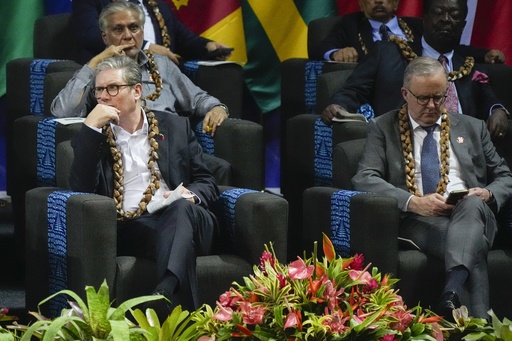
WELLINGTON, New Zealand — Australian Prime Minister Anthony Albanese has dismissed Beijing’s claims that Australia is “plagued by systemic racism and hate crimes.” This response comes after an Australian diplomat led a coalition of Western nations in voicing concerns over human rights abuses in China.
Albanese addressed reporters on Thursday, during his arrival in Samoa for a summit with Commonwealth leaders, asserting, “When it comes to China, we’ve stated that we will cooperate where possible, disagree when necessary, and engage in our national interest.” He emphasized that Australia has consistently raised human rights issues with China.
The day prior, Lin Jian, a spokesperson for China’s foreign ministry, criticized a joint statement made by 15 countries to the United Nations General Assembly—a declaration spearheaded by Australia, which emphasized severe concerns regarding human rights violations in Xinjiang and Tibet.
James Larsen, Australia’s ambassador to the U.N., called upon China to adhere to its international human rights commitments by releasing individuals unjustly detained in Xinjiang and Tibet and to clarify the status of missing family members. He referred to the situation as compelling evidence of “ongoing concerns.” Lin retorted that their statement represented “political manipulation” cloaked as concerns for human rights.
In his critique, Lin pointedly accused Australia of being “long plagued by systemic racism and hate crimes” and advised the country to focus on its internal issues instead of critiquing China.
Albanese reiterated that Australia would “always advocate for its interests” and insisted on the importance of raising human rights topics with Beijing consistently and transparently.
Since 2017, the Chinese government has undertaken a process of assimilation in Xinjiang, where approximately 11 million Uyghurs and other minority groups reside. This has reportedly involved mass detentions, coercive political education, family separations, and forced labor, among other practices. Estimates suggest that over 1 million Uyghurs, Kazakhs, Kyrgyz, and other minorities could be held in what the Chinese government refers to as “vocational training centers.” However, the United Nations Human Rights Office has suggested that credible allegations of human rights violations exist in the region.
In his address, Larsen also highlighted credible reports of abuse against Tibetans, detailing issues such as forced labor, the separation of children from families, and crackdowns on cultural and religious expression. He advocated for “unfettered and meaningful access” for independent observers to Xinjiang and Tibet.
“No nation has a flawless human rights record, yet no nation is immune to assessment of its human rights obligations,” Larsen remarked.
In response, Lin called out what he described as Australia’s hypocrisy, referencing the treatment of refugees, immigrants, and Indigenous peoples. He mentioned past alleged war crimes committed by Australian soldiers in Afghanistan, specifically referencing the unlawful killings of Afghan civilians and prisoners. Additionally, China’s criticisms often include Australia’s stringent policies regarding asylum seekers arriving by boat.
Despite improving economic ties between Australia and China following years of trade disruptions, tensions still exist, particularly concerning human rights issues and broader geopolitical challenges. China’s military assertiveness in the Asia-Pacific region continues to grow as Australia’s alliances with Western intelligence-sharing partners, especially the United States, strengthen.
During a state visit to Australia in June, Chinese Premier Qiang Li expressed his agreement with Albanese to “properly manage” their countries’ differences. However, experts like Justin Bassi from the Australian Strategic Policy Institute view China’s recent criticism as an “overreaction,” cautioning that it serves as a warning to Australia to temper its criticisms. Bassi noted that by relegating criticisms of China to fewer formal statements by officials, Australia was attempting to strike a balance, but instead found itself on the receiving end of a fierce backlash from Beijing.
